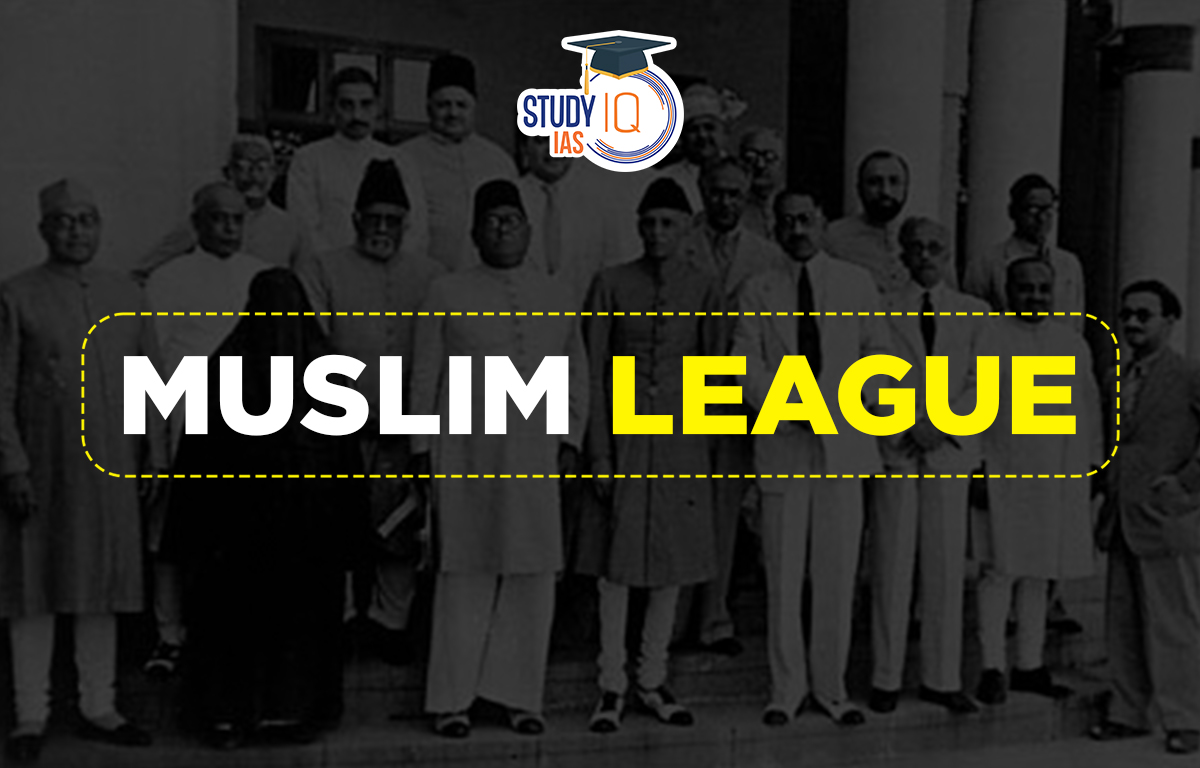Table of Contents
Muslim League
In 1906, the Muslim League was established as a political organisation in British India. The British Empire divided India in 1947 as a result of its ardent support, starting in 1930, for the establishment of a separate nation-state, Pakistan, with a Muslim majority. The party was founded because Muslims in British India needed political participation, especially in the event of strong Hindu opposition to Bengal’s partition in 1905, which was supported by the Indian National Congress.
The formation of a political organisation to advance the interests of Muslims in British India was suggested by the Nawab of Dhaka, Khwaja Salimullah, at the All India Muslim Education Conference’s annual meeting in Ahsan Manzil in 1906. This article will go over the Muslim League of 1906, which is relevant to UPSC exam preparation.
Read More: Ahmedabad Mill Strike
Muslim League History
The majority of the Islamic leadership, with the exception of a few scholars like Sir Syed Ahmed Khan and Syed Ameer Ali, who concentrated more on Islamic education and scientific advancements, ignored the earnest efforts of the Congress’s forefathers to draw Muslims to their meetings. It rejected the idea that there are two different communities in India, each of which should have its own representative in Congress meetings.
In 1885, the Indian National Congress was established. It was established with the goal of drawing the British government’s attention to the concerns and requests of all Indians, irrespective of religion. The Indian National Congress was prospering and, thanks to its collaboration with the British government, was able to bring about a number of significant adjustments to the government’s structure and policies.
While Congress achieved victory in many areas, it was unable to win over Indian Muslims. The Congress, in the eyes of Indian Muslims, was mainly a Hindu organization incapable of serving Muslim communities. It gave rise to the notion of creating a distinct political organization for Indian Muslims. Philosopher and Muslim reformer Sir Syed Ahmed Khan was the first to introduce the communal notion that Muslims are a separate country into Indian political thought.
A motion to establish the AIML was made and the prohibition on politics was removed at a meeting of the Muhammadan Educational Conference in Dhaka on December 30, 1906, which was attended by about 3000 delegates. The suggestion for the name was made by Nawab Khwaja Sir Salimullah Bahadur, and it was supported by Hakim Ajmal Khan. India’s first Muslim political group was the All India Muslim League.
| Indian National Movement From 1905-1918 | |
| Indian National Movement |
First World War |
| Partition of Bengal | Swadeshi Movement |
| Muslim League | Morley-Minto Reforms 1909 (Indian Council Act 1909) |
| Ghadar Movement | Komagata Maru Incident |
| Lucknow Pact | Home Rule Movement |
| Surat Split |
Gandhi in South Africa |
Muslim League Features
When British India was divided, the All India Muslim League was a political group that spearheaded the effort to create a distinct Muslim country (1947). Indian Muslims’ liberties were safeguarded by the Muslim League, which was founded in 1906. The league adopted self-government for India as its objective in 1913 after being initially encouraged by the British and usually in favor of their rule.
The league and its leaders, most notably Mohammed Ali Jinnah, promoted Hindu-Muslim harmony within an autonomous and united India for many years. The League of Nations didn’t advocate for the creation of a distinct Muslim state from India’s intended sovereign state until 1940. The league pushed for the creation of a separate country for Muslims in India because it was concerned that Hindus would rule an independent India.
After Pakistan gained its independence in 1947, Jinnah and the Muslim League took the lead in the battle to divide British India into distinct Hindu and Muslim states. The league later emerged as the country’s main political force.
Read More: Surat Split
Muslim League Reason for Formation
Hindus predominated in the All India National Congress. Its goals clashed consistently with those of the Muslims. By 1906, Muslim leaders were persuaded that their group required its own political party in order to speak on all significant occasions. Muslims had lacked the same level of economic and educational advancement as Hindus. Education and economic circumstances can only be improved by founding a distinct Muslim organization that can speak for Muslim interests.
Hindus’ demand that Hindi take Urdu’s position as the official language in Devanagari Script marked the beginning of the Urdu-Hindu controversy. Urdu was expelled from public service by Sir Anthony Macdonald, the Uttar Pradesh governor at the time. There was no other political party that supported Urdu; the Congress was obviously on the side of Hindi and the anti-Urdu campaign. As a consequence, there was a pressing need for the creation of a Muslim political party.
The turning point was when John Morley alluded to constitutional changes in the summer of 1906 during his budget address. Muslims at the time lacked a political platform from which to claim their fair share. They reaffirmed that they wanted a distinct political agenda. Minto declared that he backed the Muslim requests wholeheartedly. Muslims were forced to establish their own political entity as a result of Deputation’s success. Sir Syed Ahmed Khan believed that Islam were a unique group.
Muslims did not consider Hindus to be part of their own country. In terms of faith, history, languages, and civilization, they were different. Muslims had no choice but to start their own political group. The All India Muslim League was suggested by Nawab Salimullah Khan, and it was supported by Hakim Ajmal Khan, Maulana Muhammad Ali, and Moulana Zafar Ali. The All India Educational Conference adopted the motion on December 30, 1906.
Read More: Indian National Movement
Muslim League Objectives
The goal was to safeguard Muslims’ political rights, draw the government’s attention to them, and stop Muslims from harbouring prejudice towards other Indian groups. The goal was to increase Indian Muslims’ allegiance to the British government and dispel any misunderstandings about the government’s motivations for taking any particular measures.
Profiting from and advancing the political rights and interests of Muslims in India, as well as politely speaking for their needs and goals before the government. Without affecting the League’s aforementioned goals, the goal is to stop any feelings of animosity towards other groups among Indian Muslims.
Read More: Vernacular Press Act
Muslim League and Factors Promoting
Indian politics have a separatist stance and divide the country along ethnic lines. As an illustration, social politics were played between non-Brahmins and Brahmins. Muslims had no access to technical or western schooling. British perception of Muslims as a threat to their colonial strategy is influenced by the 1857 uprising. After the Mughal rule was overthrown, they established their dominance.
Expression of Religious Color- The majority of historians and extreme nationalists exalted one aspect of India’s unique culture. They were partial in their accolades because Shivaji, Rana Pratap, and other praiseworthy figures were also ignored, including Akbar, Sher Shah Suri, Allauddin Khalji, Tipu Sultan, and others. India’s economic backwardness, which is caused by a lack of industrialization and severe unemployment, and the British government’s pitiful treatment of cottage industry.
Read More: Ilbert Bill
Muslim League UPSC
In order to provide the British Government with effective coordination, the All India Muslim League set out to work towards the essential goals that had been previously mentioned as well as a few additional goals. The All India Muslim League established a new branch in London in 1908 and held a meeting on May 6th, inviting some notable and influential British who supported and praised the visions of Muslim League. This was done because the All India Muslim League understood how important it was to gain the trust of the British government because it could lead to the fulfillment of all its demands as soon as possible. To prepare for the UPSC Examination, read this piece for all the information about the Muslim League.
Read More: Indian Association of Calcutta


 Important Lakes of India, State wise and...
Important Lakes of India, State wise and...
 Buddhism History, Origin, Sect, Councils...
Buddhism History, Origin, Sect, Councils...
 Andaman and Nicobar Islands, History, Cl...
Andaman and Nicobar Islands, History, Cl...





















